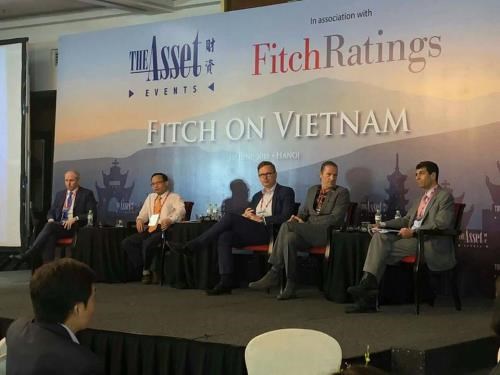Speaking at the event, Sagarika Chandra, senior analyst at Fitch Vietnam, said in May 2018, Fitch had improved Vietnam’s Long-Term Foreign-Currency Issuer Default Rating (IDR) rating from BB- to BB with a stable outlook, thanks to a rise in foreign exchange reserves and strong economic growth.
    |
 |
|
Experts discussed at the Fitch on Vietnam forum |
Vietnam records a high growth rate in comparison to emerging economies or other BB-ranked nations, she said.
The country’s GDP growth was above 6 percent in 2017 and is expected to reach 6.7 percent in 2018 and following years, she noted, adding that this was one of the important factors that helped improve Vietnam's rating.
According to the expert, the rating is a result of the country’s maintenance of macroeconomic stability, stronger resilience to external risks and compliance with financial criteria. The Vietnamese government promulgated a flexible exchange rate mechanism in early 2016, and committed to limiting national debt as well as to restructuring state-owned enterprises. Among those factors, sustainable macroeconomic performance and increased foreign reserves are the two most important elements of Fitch's rating.
Fitch forecasted the Vietnamese economy could grow 6.7 percent in 2018, making Vietnam one of the fastest growing economies in Asia-Pacific and the fastest among BB-rated countries.
Can Van Luc, chief economist of the Investment Bank for Development of Vietnam (BIDV), said Vietnam sees a positive economic outlook with recognition of many international organisations. The World Bank has also revised up Vietnam's economic growth forecast to 6.8 percent from the previous 6.5 percent, he added.
Luc said two other factors making the economy more attractive is the fast expansion of private sector consumption, which increased by about 10 percent in the past year, and the surge in private investment besides the inflow of foreign capital.
Sebastian Eckardt, the World Bank's Lead Economist for Vietnam, highlighted a number of risks and challenges to Vietnam in future.
He said the economy is highly open, making it vulnerable to impacts of external factors such as trade fights, higher oil prices, and geopolitical instability.
In addition, the tightened monetary policy adopted by many state banks is expected to exert great impacts on the world economy and Vietnam will not be spared, he said.
Source: VNA